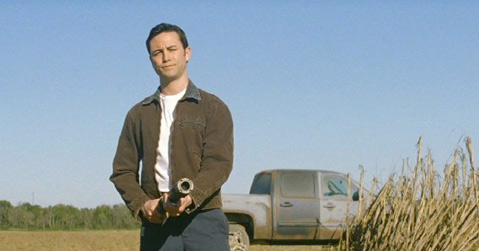Looper
Joseph Gordon-Levitt, Emily Blunt, and Bruce Willis star in a film written and directed by Rian Johnson.

In the first five minutes of the strangely captivating and tastily quirky film Looper, we get a stage-setting sense of what’s to come. There stands our antihero (Joseph Gordon-Levitt) in a Kansas cornfield, gazing at his antique pocket watch and about to go to work with a well-aimed “blunderbuss” gun. With this odd little howdy-do of a scene, we happily enter into the milieu of retro-futurist sci-fi and sense immediately that we’re in good cinematic hands, which we are, until the end. What we don’t know, apart from the central narrative conceit of the life of “loopers” — assassins, circa 2044, who off targets sent back in time from 30 years into a much darker, more dystopian future — make for the film’s critical twists.
Oh, and there is a certain love interest, in the fetching, kick-ass, and fearless parental protector form of Emily Blunt. Bruce Willis, meanwhile, is a more complicated bunch of characters, including a latter-day version of our young hero and someone with a serious score to settle, on a mission from the once-and-future future. Things get complex but never to the point of losing the primal theme at the core of the film.
Looper is one of those rare films that plays well in the multiplex and exists in the outskirts of an artier film turf, warranting its coveted spot, for instance, as the opening film of last month’s Toronto International Film Festival. Writer-director Rian Johnson has cooked up a clever and internally logical time- and mind-warping scenario that relies less on CGI and future-scaping FX than on a kind of resourceful and hypnotic tale-spinning quality not so far removed from the realm of TV’s classic The Twilight Zone, another sci-fi source that accomplished a lot within a modest budget and technical means. Coincidentally or not, Looper’s plot includes a subplot directly linked to the famous Zone episode with evil young Billy Mumy uttering the words, “You’re a bad man, you’re a very bad man” and sending evildoers into a figurative cornfield.
From start to finish, Looper draws us into its peculiar and not exactly friendly world. The film already feels like it has earned its rightful place in the pantheon of cult classic retro-futurist cinema, alongside Blade Runner, Inception, and Repo Man, not to mention the imaginary art-pulpy worlds that Rod Serling hath wrought.



